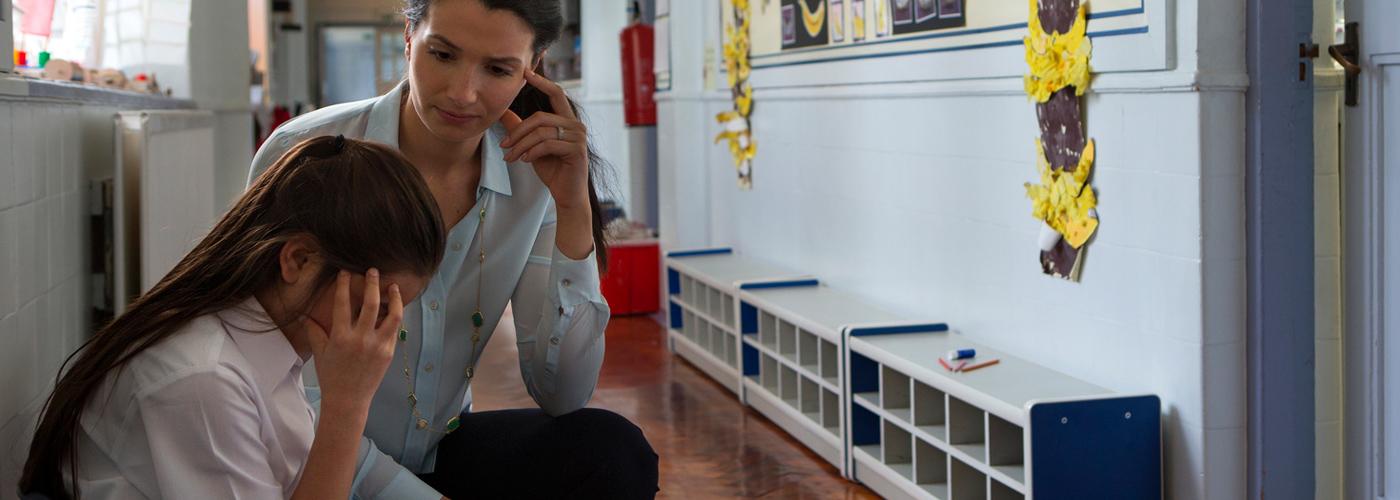Search Results for Emotions
Feeling Guilty When Raising a Child With Special Needs
Written By: Pamela DeLoatch | Resource Creation By: Keli McNeill | Design By: Sunny DiMartino
Parents are often their own toughest critics. When the idyllic picture of what we thought our family would look like is a stark contrast to what the reality is, we add on even more stress by feeling guilty about what we did or didn't do in a a sea of very complex situations. For parents of special needs children, these instances are magnified, but they are recurring thoughts of every parent, nearly every day. Break the cycle of guilt for your sake and for the sake of your child.
When Children with Special Needs Have Siblings
Written By: Geoff Campbell | Resource Creation By: Bridget Morton | Design By: Sunny DiMartino
Parents may often feel
challenged when raising a child with special needs. But when there are other
children in the family and that special-needs child has a sibling, parents often
feel even greater stress when trying to give both children the time, support,
and attention they need.
Fostering Emotional Connections with Your Child Who Has Autism
Written By: Amanda Ronan | Resource Creation By: Bridget Morton | Design By: Christy Bui, Nathan Lueth, Sunny DiMartino
As the parent of a child with ASD, you experience the love and connection with your child in ways that are different, but are no less important and valuable. By learning techniques that suit your child’s needs, you are helping them to reach their full potential and giving yourself the opportunity to experience that emotional connection.
My Child with High-Functioning Autism Doesn’t Look Like Yours
Written By: Pamela DeLoatch | Resource Creation By: Bridget Morton | Design By: Analee G. Paz, Sunny DiMartino
Why does one child with Autism behave differently from another child with the same disability? While the neurospectrum disorder can cause social, communication and behavioral changes, from mild to severe, the impact of Autism is magnified when a second (or more) disability is involved. Read on to find out how parents can understand and help a child challenged by Autism, in addition to other chronic disorders.
Through His Eyes: Natural and Logical Consequences at Home
Written By: Nancy Yeang | Resource Creation By: Bridget Morton | Design By: Sunny DiMartino
A father struggles with having his son, who has behavioral issues, understand the consequences of his actions. After a visit with a behavioral counselor, he learns about behavioral strategies, and also finds a window into his son’s world that allows him to better see and understand his perspective.
Loving Your Child—No Matter What They Do
Written By: Pamela DeLoatch | Resource Creation By: Leeann Sanders | Illustrations By: Nathan Lueth | Design By: Sunny DiMartino
There are countless books on parenting, but nothing fully prepares you to be the parent of YOUR child. Every child is different, every situation is different, and every day can be different than the last. For parents of children with special needs, this is surely the case. There is no manual for how to handle meltdowns, rage episodes, and aggressive behavior and there is no clear cut answer to how you should FEEL about your children during these times of struggle.
When Helping Can Hurt: Parent Enabling of Children with Special Needs
Written By: Agata Antonow | Resource Creation By: Bridget Morton | Design By: Sunny DiMartino
All parents want to help their children, and that can be especially true of parents who have children with special needs. Unfortunately, doing too much for your child may mean that they don’t learn some of the basic life skills they’ll need later in life.
Tracking the Clues: Using Functional Behavioral Assessment to Help Kids with Special Needs
Written By: Agata Antonow | Resource Creation By: Bridget Morton | Design By: Sunny DiMartino
Sometimes, children with special needs exhibit behaviors that seem random and are difficult to understand, leaving parents with the difficult task of figuring out what they mean and how to respond. In these situations, a set of tools known as Functional Behavioral Assessment (FBA) can help. Many parents have not heard of FBA, but counselors and therapists use this approach to systematically gather specific data about behaviors and decide on the appropriate intervention. FBA strategies can also be used in the home by parents struggling to understand specific behavior problems—and how to address them.
Stop, Think, and Don’t React: Encouraging Parents to Be Proactive – Instead of Reactive or Confrontative – During Times of Conflict
Written By: Rebecca Thomas | Resource Creation By Bridget Morton | Design By Sunny DiMartino
Parents may often find themselves resorting to ultimatums, threats of punishment, removing privileges, or simply throwing up their hands when their child with special needs is having a meltdown and exhibits demanding or irrational behavior. Before exercising rigid authority, which often worsens challenging behavior, parents can instead use personal coping strategies to help themselves stay centered and focused so they remain calm in the face of conflict and, in turn, help their child become more calm as well.
Returning to Safety: Understanding and Reducing Self-Injurious Behavior
Written By: Julie Wallach | Resource Creation By: Bridget Morton | Design By: Sunny DiMartino
A seven-year-old girl's increasingly extreme self-injurious behavior requires understanding, thoughtful solutions, and careful planning. After a very challenging period of time, Lyla* receives the adult understanding, special education, and therapeutic care she needs to keep herself safe from her own harm.
Scaling Emotional Hurdles in the Classroom with Emotional Scaling
Written By: Geoff Campbell | Resource Creation By: Bridget Morton | Design By: Christy Bui, Sunny DiMartino
Some children have difficulty understanding their emotions, which can sometimes lead to class-disrupting episodes of anger. By working closely with students and using strategies like emotional scaling, teachers and educators can help students better understand emotions, changes in intensity, and coping strategies, which often leads to increased self-control in the classroom.
Swing Low, Swing High: Parents Moving into Emotional Scaling for their Daughter
Written By: Nancy Yeang | Resource Creation By: Bridget Morton | Design By: Christy Bui, Sunny DiMartino
Parents of children with Reactive Attachment Disorder (RAD) and other trauma and stressor-related disorders try many techniques to mitigate the problems with emotion regulation and aggressive behavior. Emotional scaling can help children with RAD to better understand their emotional experience in order to regulate their emotions and behavior before experiencing outbursts of agitation and aggression.